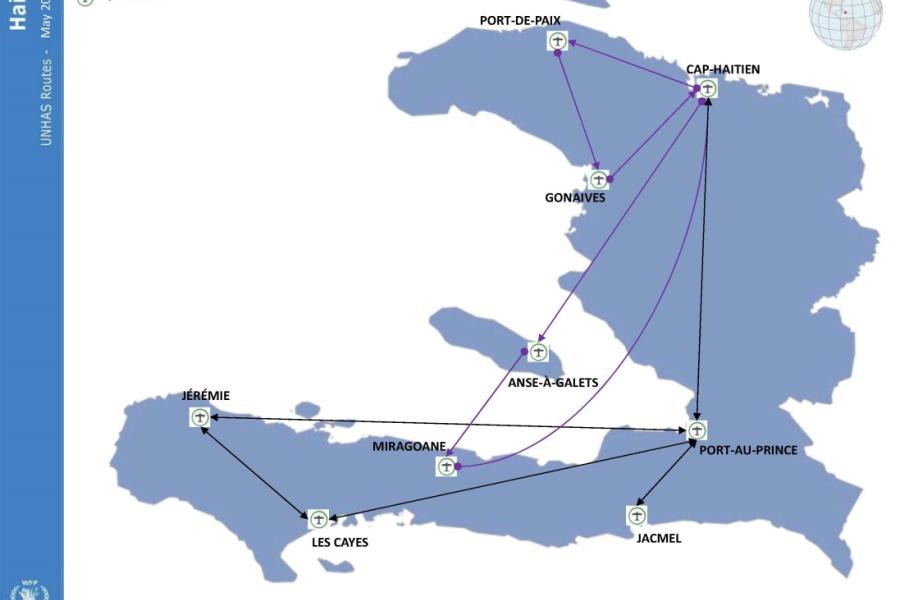Flash Appeal for the United Nations Humanitarian Air Service (UNHAS) in Haiti

WFP urgently REQUIRES US$3.9 million to maintain UNHAS operations.
WFP urgently REQUIRES uS$3.9 million to maintain UNHAS operations - the only aviation support available to the humanitarian community in Haiti, for the next 3 months. This critical funding is needed to avert an im-minent risk of UNHAS closure, jeopardizing the timely delivery of aid and personnel as humanitarian needs escalate in the country.
Country context
Haiti is experiencing a protracted political, security and socio-economic crisis, placing it among the most acute hunger crises in the world. With over half of the country grappling with hunger, the Global Humanitarian Overview estimates that in 2025, 6 million will need humanitarian assistance, of which 4 million will be prioritized.
Surging insecurity in Haiti in 2024 led to unprecedented humanitarian needs, while also necessitating flexibility and innovation from UNHAS to continue providing essential air transport services for the humanitarian community. Increased violence associated with armed groups, mostly in the capital, led to an upsurge of people being forced to flee their homes, bringing the total number displaced people to more than 1 million by the end of 2024, more than a threefold increase in a year. According to the Integrated Food Security Phase Classification (IPC) for Haiti published in September 2024, 5.4 million people in Haiti were facing acute food insecurity, of which 2 million are categorized as experiencing emergency levels of hunger.
The suspension of all commercial flights serving the Port-au-Prince airport until further notice, has only intensified these issues, isolating affected populations and severely restricting access to essential services. As humanitarian needs escalate, the situation on the ground underscores the urgent requirement for immediate and robust interventions to support those most vulnerable.
Why is UNHAS critical in Haiti?
The current funding outlook places UNHAS at risk of imminent shutdown in Haiti, where the escalation of violence has effectively suspended all commercial air services to the Port-au-Prince airport, severely limiting the movement of humanitarian aid and personnel in a time of critical need. The United Nations Humanitarian Air Service (UNHAS) - as the only available aviation support serving Port-au-Prince - is therefore uniquely positioned to bridge this gap by providing uninterrupted access for aid organizations.
UNHAS ensures rapid deployment of staff and transport of light cargo, and offers vital capacity for medical evacuations that are essential in an environment where traditional commercial options are unavailable.
UNHAS operational plan
To ensure continuous humanitarian access and effective emergency response in Haiti, UNHAS will maintain its current operational fleet, which comprises one fixed-wing aircraft and one helicopter. These two assets are critical to sustaining operations in an environment where commercial aviation options are unavailable. Given the closure of the Port-au-Prince commercial airport, the helicopter’s ability to operate from alternative locations, such as the United Nations office-adjacent field in Juvenat, is indispensable.
UNHAS Haiti Route Map

UNHAS will continue a fully operational mission to enable humanitarian efforts and access in a safe and efficient manner. A Chief Air Transport Officer will lead the mission, supported by essential operational personnel. Ancillary services will be activated to ensure seamless operations.
UNHAS is planning to operate daily flights to Petion-Ville and nine additional destinations throughout Haiti. These regular airbridges will ensure vital humanitarian access to communities in need, facilitating the rapid deployment of aid workers, the transport of critical life saving supplies, and the execution of emergency medical evacuations.
The flight schedule will be continuously reviewed and adjusted in response to evolving operational needs, ensuring that the service remains responsive and effective during this critical period.
About UNHAS
UNHAS, managed by the World Food Programme, provides passenger and light cargo air transport services, enabling the humanitarian and development community to implement timely and effective responses in emergencies and protracted crises.
Currently active with 21 operations globally, UNHAS plays a crucial role in ensuring timely and safe access to populations affected by hunger, conflict, insecurity, climate-related shocks, and health emergencies.
Governance & business models
UNHAS Haiti will continue to adopt a standard UNHAS governance structure. This includes a Steering Committee and a User Group Committee, both meeting regularly according to the WFP Aviation Policy in place. This structure ensures oversight and responsiveness to user needs.
Flights in Haiti continue to operate under a partial cost recovery model to ensure ongoing humanitarian access, while limiting costs. Should funding challenges persist, the Steering Committee will revisit this framework and may consider adjustments to increase cost recovery, thereby enhancing long-term sustainability and offsetting a larger share of operational costs.
Estimated Costs
The estimated cost to continue operating UNHAS Haiti with 1 fixed wing and 1 Helicopter for 3 months is US$3.9 million. This covers the aircraft, essential staffing, ground handling, and aviation fuel, ensuring a reliable flight schedule.
Exit strategy
UNHAS flights will be reduced or discontinued when reliable commercial aviation services are available to serve the humanitarian and development community and/or overland access improves.
If humanitarian needs decrease, WFP will scale down operations accordingly, reallocating resources, as needed. This ensures a responsible and flexible approach to service termination.
Contacts
WFP Haiti Country Office
Armando PUOTI
WFP Chief Air Transport Officer
armando.puoti@wfp.org
Raphael Guevin-Nicoloff | Head of Partnerships & Reporting
raphael.guevinnicoloff@wfp.org
WFP Headquarters Italy
Franklyn FRIMPONG | Chief WFP Aviation Service
franklyn.frimpong@wfp.org
Hedley Tembeng TAH | Head of Information Management and External Relations Unit
hedley.tembeng@wfp.org
World Food Programme
Via Cesare Giulio Viola 68/70,
00148 Rome, Italy - T +39 06 65131
wfp.org












